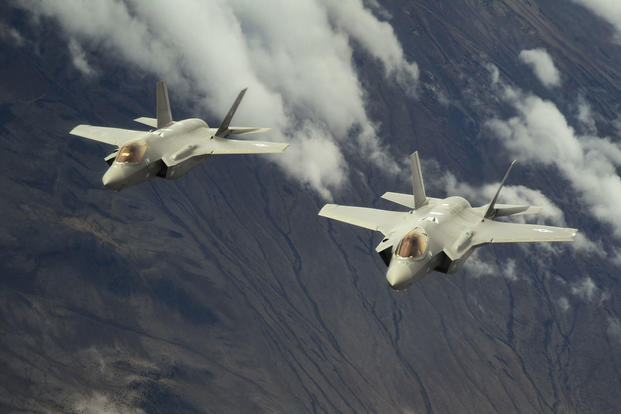Deliveries of F-35A Joint Strike Fighters for the Turkish pilot training program continue, despite the halt of equipment shipments to Turkey.
One Lockheed Martin-made fifth-generation jet was delivered to Luke Air Force Base, Arizona, on Wednesday, and another is scheduled to be delivered Friday, a Defense Department official told Military.com. The base already had two jets belonging to Turkey for the international training program.
Earlier this week, the U.S. halted shipments of F-35 equipment to the NATO ally after it refused to back down from its intent to purchase the Russian-made S-400 surface-to-air missile system. The freeze on related equipment remains in place, but officials determined that the delivery of additional jets to Luke's training program "didn't pose risk" to the U.S., the official said.
Acting Pentagon spokesman Charlie Summers told reporters during a briefing Thursday that the base's pilot training program for Turkey is ongoing.
"No operations have changed at Luke," added 56th Fighter Wing spokeswoman Maj. Rebecca Heyse.
Related content:
- US Halts Shipment of F-35 Equipment to Turkey
- General Tapped to Head NATO: Cancel F-35 Sales to Turkey
- Luke Air Force Base Readies for Additional F-35s to Train Turkish Pilots
Summers said the Pentagon has no immediate plans to take back the first two Lightning II jets that belong to Turkey.
Mevlüt Çavuşoğlu, Turkey's minister of foreign affairs, said Wednesday that his country is "definitely" moving forward with its purchase of the S-400, known as the "F-35 killer" by Moscow.
"It's a done deal," Çavuşoğlu said during the "NATO Engages" event in Washington, D.C., to mark the alliance's 70th anniversary. "This is a done deal."
After months of discussions, the Pentagon is still hopeful that Turkey will change course and instead buy the American-made Patriot missile system.
"I am very confident in the Patriot proposal that we've delivered to Turkey, its availability, it's pricing, and very importantly, the industrial participation that comes along with the Patriot system," Acting Defense Secretary Patrick Shanahan said this week.
"I've had a number of conversations with Defense Minister Akar, and I really think we'll resolve this situation with our strategic partners," he said.
In an effort to keep Turkey from buying Russian-made weapons, the State Department in December approved the potential sale of the Patriot missile system and related equipment to the country for $3.5 billion. Turkey, however, has said the system is insufficient for its needs.
Lawmakers are moving forward to ban the transfer of the F-35 to Turkey and bar future sales until the U.S. is satisfied it will not accept any S-400 systems from Russia. The jets that Turkey has already purchased are slated to be transferred overseas by the end of this year, a defense official previously told Military.com.
Last week, Sens. James Lankford, R-Oklahoma; Jeanne Shaheen, D-N.H.; Chris Van Hollen, D-Maryland.; and Thom Tillis, R-N.C., introduced legislation over concern Turkey's planned S-400 purchase would pose a risk to U.S. national security.
"The prospect of Russia having access to U.S. aircraft and technology in a NATO country, Turkey, is a serious national and global security risk," Shaheen said.
The group introduced a similar bill last year.
-- Oriana Pawlyk can be reached at oriana.pawlyk@military.com. Follow her on Twitter at @Oriana0214.












